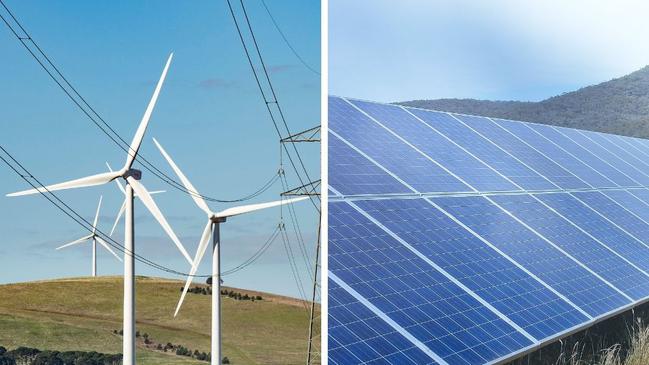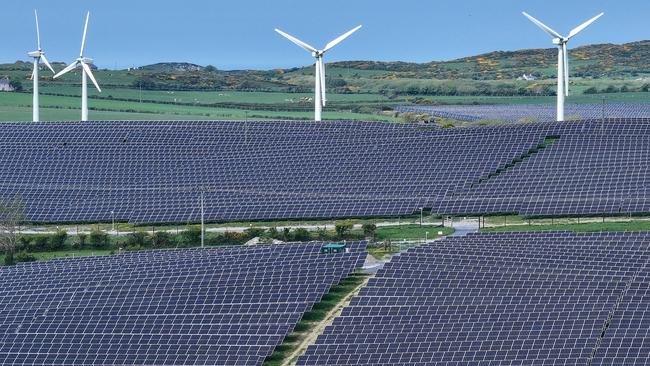Bureaucratic red tape’s threat to net-zero target and international investment
Hundreds of millions of dollars of foreign investment could slip through Australia’s fingers and net-zero targets could fail because of environmental approval red tape, a new report says.

Australia risks missing out on hundreds of millions of dollars of foreign investment and failing its net-zero emissions targets because renewable projects are tied up in environmental red tape for up to five years, a new report has found.
The Clean Energy Investor Group and Herbert Smith Freehills report states that projects are being bogged down by complex environmental assessments under the Environment Protection and Biodiversity Conservation Act.
The CEIG wants urgent reform of environmental laws and more resources to deal with the backlog, which threatens net-zero targets being pursued by the federal government. Clean Energy Investor Group chief executive Richie Merzian said the majority of renewable projects referred to the EPBC three years ago still had not received a final decision.
“This hampers investment, it risks further increases in the cost of capital and is detrimental to Australia’s net-zero transition,” Mr Merzian said.

“Australia is competing for capital with the rest of the world, with three quarters of the investment in renewable projects coming from overseas.
“No one wants to build more coal-fired power stations so we have to build new generation.”
This week, the Tasmanian business community called on Prime Minister Anthony Albanese to intervene over Environment Minister Tanya Plibersek’s delays to a major wind farm there.
Ms Plibersek was on Monday due to either approve or decline a $1bn, 900MW wind farm on Robbins Island in Tasmania’s northwest, but has instead pushed her decision all the way out to March 7.
Mr Merzian said that despite investors needing certainty from what should be a standard government approval process, there had been an almost doubling of project referrals under the EPBC from 2020 to 2023 – rising from 23 to 40.
Only six of 19 project referrals to the EPBC from 2021 had received final approval, with none from 2023 having been given the green light.
Mr Merizian said it was not just a matter of more bureaucrats, but more co-operation between the states on environmental approvals. “Some of the states mirror the federal approval process so you are having to do the same survey twice,” he said.
A review of the EPBC conducted by Professor Graeme Samuel before the last federal election found that the current laws were failing nature.

Mr Merizian said that while major EPBC reforms before parliament required urgent progress, the federal government could act now on a number of quick wins to secure the confidence of investors, support emission-reduction targets and lower electricity prices for consumers.
The report calls for “administrative wins” to speed up approvals, including aligning of state and federal assessment processes to eliminate duplication, limiting requests for additional information to reduce procedural bottlenecks and delays, and increasing resourcing within the Department of Climate Change, Energy, the Environment, and Water to handle assessments efficiently.
It also has called for the standardising of environmental conditions to improve predictability and transparency.
“It is unfortunate that as the roll-out of renewable energy projects gathers pace, there is a doubling of renewable projects referred to the EPBC Act and a doubling in time to assess them,” Mr Merizian said.
“Inconsistent and inefficient regulatory processes are hindering the billions of dollars of investment needed for Australia’s clean energy transition.
“The government’s 82 per cent renewable electricity target is at significant risk unless these issues are resolved.”
Herbert Smith Freehills environment, planning and communities partner Kathryn Pacey said that much of the delay, financial impost and procedural impediments to the delivery of renewable energy projects resulted from the EPBC Act.
“We have identified quick administrative wins to accelerate EPBC Act assessments and support more predictable processes and time frames for renewable projects,” Ms Pacey said.
“Implementing these wins, along with other legislative reforms, will speed up energy transition projects without undermining the need to protect and enhance biodiversity in Australia.”







To join the conversation, please log in. Don't have an account? Register
Join the conversation, you are commenting as Logout